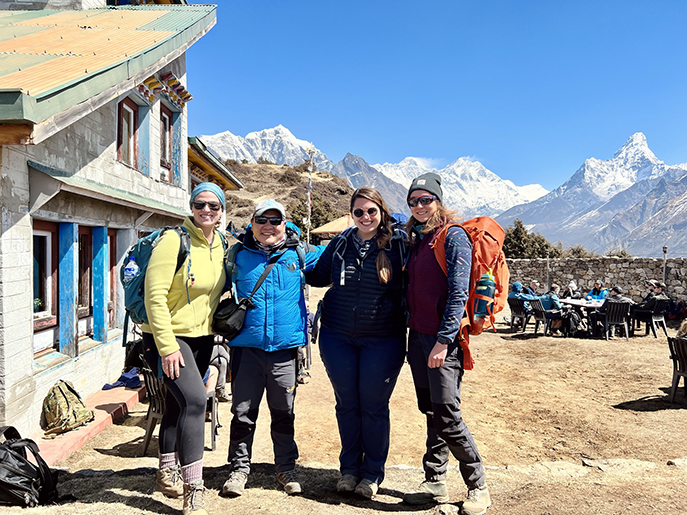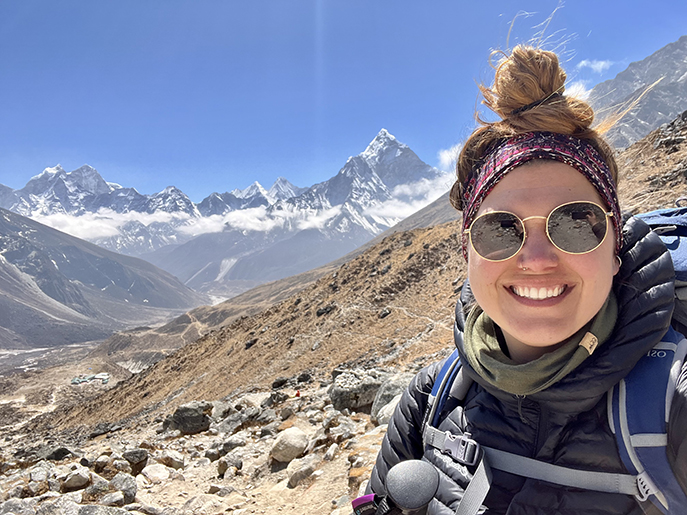Following a steep, ten-day hike, Megan Roberts and her party reached Everest Base Camp, where climbers prepare to ascend the world's tallest mountain.
While summiting Mount Everest is a feat reserved for top athletes, the trek to base camp is a more accessible way to see the heart of the Himalayas -- but that doesn't mean it's easy. The 80-plus mile hike begins at 9,251 feet in elevation and climbs over 8,000 more -- with base camp at 17,598 feet above sea level.
The high altitude can take a toll on a person unaccustomed to such thin air.
"There's not much opportunity for [altitude] training in Tennessee," says Roberts, who made the trek in March with her college friend, Logan Shoaf, and their guide, Dawa Pun.
Before that, Roberts, who works as news director for Local 3, says she was a casual day hiker.
"Fifteen miles was the longest hike I'd done. That was to [North Carolina's] Mount Mitchell," she says. "I'd never done anything like [the Everest trek]. There were so many big unknowns."
When her party finally reached camp, Roberts says she was surprised how much smaller Everest looked from its base. Across the rocky tundra, she saw a smattering of tents belonging to climbers preparing to attempt their summit.
None of them knew at the time, but they'd be among the last to visit that base camp.
In June, Nepali officials announced plans to move Everest Base Camp to a lower altitude due to the effects of climate change and human activity on the nearby Khumbu glacier, now rapidly melting, causing the ground the shift.
Within Roberts, another transformation was taking place.
Here, in her own words, Roberts shares her story.
> I have always struggled with body image issues. I would tell myself that I'm not fit enough to do x, y or z. Then, a couple of years ago, I started challenging myself. I started with small hikes.
> I'm curvy. I don't have what people would think of as an athletic build. I know what I'm capable of, but I've spent a lot of time letting other people's perceptions of what I can do affect what I do. My doctor actually asked me, "Are you fit enough for [that trek?]"
> On average, I'd say 7-10 miles is a normal [day] hike for me. Last week, I opted for a shorter hike to this great campsite on Huckleberry Knob in Robbinsville, North Carolina. I'd scouted the campsite on AllTrails and found this review where somebody talked about wild hogs. I wanted to be prepared but thought it probably won't happen. It did. I ended up being in a situation where I was chased off by one. I had Googled, "How to defend yourself against wild hogs." The No. 1 suggestion was run -- so I ran.
> In 2020, I went to the Pacific Northwest and did a 15-mile hike near Mount Rainier. I'm from the South and didn't travel much as a child. That was my first time seeing a mountain like that, and my first thought was, I want more of it. My mind went straight to Mount Everest.
> I'm very much a nerd in the sense that I love researching trips. Summiting Everest was not in my wheelhouse, so I started researching other options. I'd heard about [the trek to] Everest Base Camp, but didn't know much about it.
> I had that moment of, "I'm going to do that!" Then the self-doubt crept in, and I thought, "No, you can't do that. You're not mentally or physically strong enough." But that doubt became my fuel to make it happen.
> We wanted [a guide] that was hyper-local to keep money in that community. We did research and joined travel groups and the name Dawa Pun kept popping out. Based on his reputation, I took a risk. I reached out to him on Facebook. He was so wonderful. He was an angel; he was so encouraging. Throughout all of 2021, he would check in. He took care of all the lodging arrangements, all of the food and had set up some experiences in Katmandu. The cost was $1,900, and that included a flight [from Katmandu] to Lulka.
> [Dawa's] done the Everest Base Camp trek specifically about 100 times since 1993. We were his first group post-pandemic. We, the trekkers, joked that we were going to get "Dawa" written in a heart tattooed on our arms instead of an Everest tattoo.
> Four to five months before we left, I started consistently trekking with my backpack. I'd stuff it with weights and blankets anytime I went on a hike or took my dogs for a walk. I started getting on the StairMaster with my pack, and doing incline walks on the treadmill.
> [In the Himalayas,] I never got altitude sickness per se, but I struggled with breathing all the way to base camp. It was so bad. It felt like I had not trained one bit. I'd take five steps and have to stop. In the morning, I'd feel nauseous and not want breakfast. Dawa would say, "Just three more bites."
> I had to tell myself, "This is reality. Every day will be hard, but we'll get to where we're going."
> We saw lots of yaks. You'd think after seeing hundreds of yaks you'd stop being excited about them – but I never did.
> The physical challenge was tough, but I can confidently say I never felt sore. I never felt physically exhausted. It was the mental challenge. Your clothes are dirty. You haven't showered in ten days. I had this gnarly cough from the dry air. I'm eating nothing but carbs -- rice, pasta, bread.
> It was never as cold as I expected it to be. You imagine you're going to be trudging through snow every day, but that only happened once -- we were thigh-deep in snow there. The wind made it a little more chilly, but with the sun out, it was probably in the 40s most days.
> Once you get above the treeline, it's 360-degree views all around you. Every mountain is so large, I was constantly like: Is that Everest? Is that Everest? Is that Everest? But day three was the first moment we were able to see it. It was surreal. It looked so far off.
>Base camp was a lot bigger than I expected. It was strange. I expected Everest to be towering over me, but when you get there, it doesn't look that big. It was emotional though. I'd spent 1.5 years dreaming of this moment.
> I've always had this not-great relationship with my body. For these legs that I hated for so long to carry me all that way, it was the biggest middle finger to self-doubt. But it was also just a small part of the work I'm doing to be happier with myself. It is part of the journey to acceptance. My biggest takeaway is that you can do it. Have faith in yourself.


